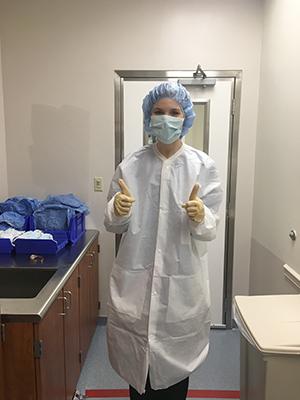Internship Spotlight: Julie Thiede
 Name: Julie Thiede
Name: Julie Thiede
Major: Dietetics
Expected graduation date: August 2018
Internship Locations: Weisskopf Child Evaluation Center, Louisville, KY
University of Louisville Hospital, Louisville, KY
Webster County Public Schools, Dixon, KY
Please describe your typical day as an intern: Every day of the internship presents unique opportunities to learn and grow as a dietitian. Therefore, no day is the same. In my current rotation at Weisskopf, I spend most days learning under three dietitians who serve children with various metabolic and genetic disorders. I also participate in the child evaluation program, where the dietitian participates alongside the interdisciplinary team (pediatrician, psychologist, OT, SLP) to evaluate the needs of a patient with developmental delays in regards to feeding, behavior, and communication. In-person and over-the-phone nutrition counseling is a key component of treatment for patients and families. I usually observe and assist the RD in at least two counseling sessions a day.
How are you using and applying classroom knowledge in your internship?
I apply concepts learned from many of my undergraduate DHN courses in my internship. I apply the concepts I learned in Nutrition through the Lifecycle I and II, as well as Medical Nutrition Therapy II every day when assessing the needs of our patients. I review many metabolic pathways learned in Nutritional Biochemistry in order to understand nutrition on a molecular level for patients with metabolic disorders. Lastly, I am using counseling skills developed in my Nutrition Counseling course to explore barriers and facilitate behavior change with patients and families.
What is one key thing you have learned during your internship?
One key thing I have learned is that I must assess nutrition needs from a social-environmental perspective as well as a clinical perspective in order to have effective outcomes. I give many recommendations for patients to improve dietary intake and lifestyle behaviors, but if their environment or socioeconomic status does not allow them to do so, those recommendations are not be helpful to the patient. A dietitian must play the role of an investigator in order to discover barriers to behavior change. Setting small and realistic goals that the patient can actually meet will produce confidence and encouragement needed for behavior change.
If you could share one piece of advice for other students who are preparing to complete an internship, what would it be?
Remember that every day is a new opportunity to learn and grow as a dietitian. There are always new concepts to learn and skills to sharpen, but it might require actively pursuing on your end to find them. Also, take correction with a humble attitude and be grateful for it! Your preceptor's job is to provide constructive criticism in order to better prepare you for when you are practicing on your own.
